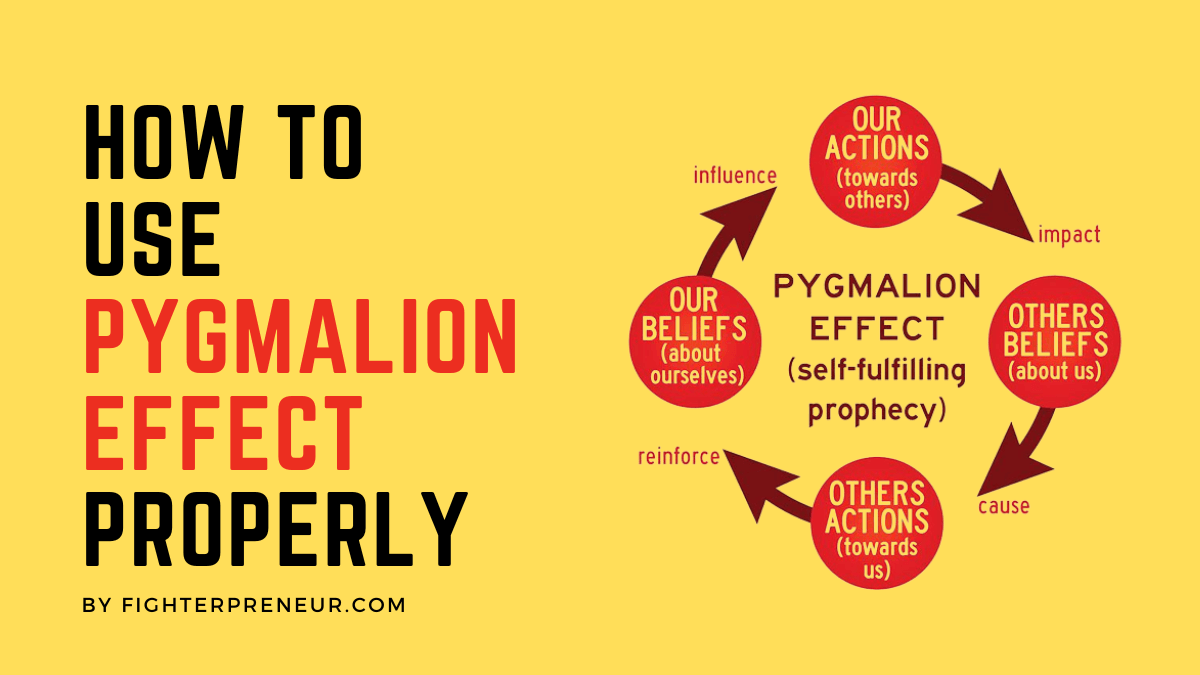
Table of Contents
Subscribe & Get Yours Goal Setting Template for 2024
How to Use the Pygmalion Effect: The Self-Fulfilling Prophecy | Leadership | MMA
Have you ever heard of the Pygmalion Effect? It’s a fascinating concept that has been studied for decades, and it could hold the key to unlocking your full potential. The Pygmalion Effect is essentially a self-fulfilling prophecy, where our beliefs and expectations about ourselves or others can influence our performance and behavior. In this article, we’ll explore what the Pygmalion Effect is, how it works, and how you can use it to your advantage. We will answer the most common question about self fulfilling prophecy.
What is the Pygmalion Effect?
The Pygmalion Effect was first identified by psychologist Robert Rosenthal in the 1960s. He found that teachers’ expectations of their students’ academic potential could actually influence their performance. In other words, if a teacher believed that a student was capable of high achievement, they would provide more attention, support, and opportunities for that student to excel. This, in turn, would often result in improved academic performance.
Since then, the Pygmalion Effect has been studied in various contexts, from sports to business to personal development. It shows that our beliefs and expectations about ourselves and others can have a profound impact on our behavior and outcomes.
Are Rosenthal and Pygmalion Effects Related?
Yes, the Rosenthal Effect and the Pygmalion Effect are related. The Rosenthal Effect is essentially a specific example of the Pygmalion Effect, where a person’s expectations of another person can influence their performance. The term “Rosenthal Effect” specifically refers to Robert Rosenthal’s original study on the Pygmalion Effect in the classroom.
But the Pygmalion Effect can apply to many different contexts, not just education. It shows that our beliefs and expectations about ourselves and others can shape our reality and influence our outcomes.
Why is it called the Pygmalion Effect?
It is a phenomenon where higher expectations lead to better performance. This effect is named after the Greek myth of Pygmalion, a sculptor who fell in love with one of his creations and brought her to life with his love and high expectations. In the same way, when we hold high expectations of ourselves or others, we tend to perform better.
Is the Pygmalion Effect Ethical?
Some may argue that this is a form of manipulation, it is important to note that the Pygmalion Effect can also be a positive force. By setting high expectations for someone, we are encouraging them to aim for greatness and achieve their full potential. In fact, studies have shown that the Pygmalion Effect can have a significant impact on academic and workplace performance, leading to higher productivity and success. So, is the Pygmalion Effect ethical? It depends on how it is used. If it is used to encourage and support someone towards their goals, it can be a powerful tool for success.
Pygmalion Effect in MMA

Let’s take an example from the world of MMA fighting. If a coach believes that a fighter has the potential to become a champion, they may provide that fighter with more attention, support, and training opportunities. This, in turn, could lead to the fighter performing better and potentially becoming a champion. On the other hand, if a coach has low expectations for a fighter, they may not provide them with the same level of support or opportunities, leading to poorer performance.
Studies have shown that the Pygmalion Effect can be a powerful motivator, especially when combined with specific, actionable feedback. In one study of the American Psychological Association, researchers found that when managers provided positive feedback and high expectations for their employees, those employees performed better than those who received negative feedback and low expectations.
An Athlete Example
Jon Jones is a prime example of the Pygmalion Effect in MMA. Despite a troubled past and numerous setbacks, Jones’ coach, Mike Winkeljohn, never lost faith in his abilities. With Winkeljohn’s constant belief and encouragement, Jones rose to become one of the greatest fighters in MMA history. His success can be attributed to the Pygmalion Effect – by setting high expectations for Jones and providing him with the support and guidance he needed, Winkeljohn helped him achieve his full potential. Jones’s story is a testament to the power of belief and the Pygmalion Effect in achieving greatness.
How to use the Pygmalion Effect?
To use the Pygmalion Effect, we need to first cultivate a positive mindset through mindfulness and meditation techniques. A study published in the Journal of Applied Psychology found that mindfulness can improve cognitive flexibility, attentional control, and working memory, leading to improved problem-solving and decision-making skills. Additionally, meditation can improve emotional regulation and reduce stress, which can positively impact our mindset and performance.
Once we have a positive mindset, we can set high expectations for ourselves and others. A study conducted by Harvard University found that managers who held high expectations for their employees had higher employee performance and productivity compared to managers who held lower expectations. By setting high expectations and believing in our abilities, we can increase our motivation and strive towards achieving our goals.
What is the Pygmalion Effect in Leadership?
The Pygmalion Effect is a powerful tool for leaders to inspire and motivate their teams to achieve greatness. As a leader, setting high expectations for your team and believing in their potential can lead to improved performance and increased motivation.
One study published in the Journal of Business and Psychology found that leaders who held high expectations for their employees had higher job satisfaction and performance compared to leaders who held lower expectations. By believing in our team’s potential and setting high expectations, we can create a positive work environment and improve overall team performance.
How to Use the Pygmalion Effect in Relationships?
The Pygmalion Effect can also be applied to relationships. By believing in your partner’s abilities and potential, you are setting them up for success. This means providing them with support, encouragement, and a safe space to grow and learn. By communicating your belief in them, you are giving them the confidence they need to tackle challenges and reach their full potential. Studies have shown that when partners have high expectations for each other, they are more likely to have a satisfying and successful relationship. So, if you want to improve your relationship, start by believing in your partner’s abilities and supporting them towards their goals.

